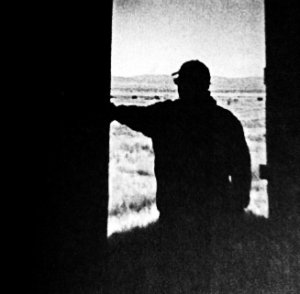I took Nika out skijoring both days this weekend. She’s still doing really well, although she wasn’t pulling as hard on the way back as she did last weekend. We had a lot of wind on Friday and it blew debris all over the trail, so not only did that slow us down, but there’s a lot more distractions for Nika. Andrea took a few photos as we came back to the house. If you click on the images you can see larger versions. There’s a sled dog team behind me in the first photo.
Andrea is out racing in North Pole and had plenty of handlers, so I decided to stay home. Instead of taking Nika for a regular walk, I waxed my skis and tried skijoring. Andrea taught her to do it almost ten years ago, but Nika hasn’t done it since, and she wasn’t very good at it back then anyway. Today I took her down to the Creek, put on my skis and hooked her up. She knew right away what was going on and she ran straight ahead and pulled like a champion dog. I have a two mile trail that starts on the Creek and then crosses up to the mushing trail in the forest for the return trip home, and Nika was hooked up for about two-thirds of it. On the mushing trail, she was pulling me fast enough that the wind was whistling in my hair and I was worried about what would happen if I fell down (I haven’t been skiing in ten years either…). Luckily, I managed to keep my balance, and except for dipping for poops, she kept up the pace the whole way.
I’m very proud of her. She did a very good job, and both of us had a good time.
On Tuesday I got a 1939 edition of Aaron Copland’s wonderful book, What to Listen for in Music. I recently came across Alex Ross’s manifesto from The New Yorker, and while looking up the Bernstein books he recommended, amazon “suggested” I look at Copland’s book. I’m glad I did. Several quotes from the book make me think Ross would recommend it too:
I have often observed that the mark of a real music lover was an imperious desire to become familiar with every manifestation of the art, ancient and modern.
– Aaron Copland. 1939. What to Listen for in Music. p. vii.
This is one of the things I like about reading Ross’s columns; he’s interested in all types of music, even if he typically writes about “modern” classical music (a phrase he certainly wouldn’t like anyone using to describe his columns, but sometimes you’re stuck describing something the way everyone else does). Copland mentions jazz quite a few times, and while rock and roll doesn’t appear in the book, I’ll bet he listened to and appreciated that musical form too.
Another quote:
If all new music sounds continually and unrelievedly dissonant to you, then it is a safe guess that your listening experience is insufficient as regards music of your own time—which is not so strange in the majority of cases, when we realize the small proportion of new music heard by the average listener compared with what he hears of the music of former times.
– Ibid. p. 75.
Something I’ll have to keep in mind in listening to Stockhausen…
The book also features listening suggestions. In the section on musical texture and polyphony, Copland suggests listening to Bach’s Ich ruf zu dir, Herr Jesu Christ (BWV 639 and part of the “Little Organ Book”, Orgelbüchlein). I pulled out and ripped the Complete Bach Edition CD VI-6, which contains this piece. As an example of polyphony, it’s actually the simplest work in the Orgelbüchlein, having only three voices instead of the usual four (or five in the case of BWV 599, Nun komm, der Heiden Heiland). Copland suggests listening four times; first listening for the main soprano melody, then isolating the bass line, then the alto melody, and finally trying to hear all the melodies at the same time. Here’s what the first few measures look like:

js bach, ich ruf zu dir, herr jesu christ
notation from the mutopia project
This will take some more practice. I can get the soprano and the bass melodies pretty easily, but I have a hard time pulling out the alto melody, and hearing them all at the same time.
The second movement of Bach’s Italian Concerto (BWV 971) also comes up in the rhythm section, and in the initial discussion of melody. It’s on the Complete Bach Edition CD II-10. There’s no score for it at the MutopiaProject, but it is easy enough to hear what Copland is talking about. Bach simulates the contrasting instruments that are normally part of a concerto by playing the two different manuals (forte and piano) of a harpsichord against each other.
In the section on musical forms, Copland cites the classic passacaglia variation form, Bach’s Passacaglia and Fugue in C Minor (BWV 582). CD VI-10 in my box set, so I ripped it and listened to that one too. A passacaglia has a repeated bass melody, but each time it repeats, it’s a bit different. Bach takes this to extremes by the end of this version, but because it starts slowly and the variations change incrementally, it is really easy to pick up the melody as it repeats, even when it moves completely off the bass line. If you’ve got a copy of it, listen carefully, following along with the music below (don’t worry, I can’t read music either…).

js bach, passacaglia and fugue in c minor
notation from the mutopia project
Bach comes up again in the chapter on free forms since Bach wrote so many preludes (the free form) and fugues. The example cited is the B flat major Prelude from Bach’s The Well-Tempered Clavier, Book I (BWV 866). It’s on CD II-2. Listening to the prelude part, and then the fugue part of the same work is instructive. The prelude moves forward, the long line meandering around, but there’s nothing obvious (melody, rhythm, etc.) tying it together. When the fugue comes around, you can hear the contrapuntal melodies traveling around each other in a way you don’t hear in the prelude.
There’s a lot to listen to, and a lot of listening to do, but I’m beginning to feel like I have a few more of the tools needed to really understand what’s going on in the music.
The last paragraph in the book reads,
Music can only be really alive when there are listeners who are really alive. To listen intently, to listen consciously, to listen with one’s whole intelligence is the least we can do in the furtherance of an art that is one of the glories of mankind.
– Aaron Copland. 1939. What to Listen for in Music. p. 253.

byars, the sinking of the titanic (jeck, alter ego)
Yesterday was a refresh day for me on eMusic, and I focused on modern classical recordings; I downloaded records by composers Gavin Bryars, Brian Eno and Joan Tower.
The Sinking of the Titanic, composed by Gavin Bryars and performed here by Philip Jeck and Alter Ego is a 1969 piece he wrote based on speculations about the sinking of the ship. The music is centered by an Episcopal hymn, Autumn which was played on the deck of the Titanic as the ship was going down (although many passengers reported the band was playing Nearer, My God, to Thee, more traditionally associated with the Titanic sinking). According to Harold Bride, the junior wireless operator:…from aft came the tunes of the band…The ship was gradually turning on her nose—just like a duck that goes down for a dive. I had only one thing on my mind—to get away from the suction. The band was still playing. I guess all of the band went down. They were playing Autumn then. I swam with all my might. I suppose I was 150 feet away when the Titanic, on her nose, with her afterquarter sticking straight up in the air, began to settle slowly…The way the band kept playing was a noble thing. I heard it first while we were still working wireless, when there was a ragtime tune for us, and the last I saw of the band, when I was floating out in the sea with my lifebelt on, it was still on deck playing Autumn. How they ever did it I cannot imagine.
I haven’t heard any other versions of the work, so I have nothing to compare it with, but Alter Ego’s version is ethereal and flowing. There’s no melody or rhythm to catch, but it has a dark feeling and constant slow movement from one soundscape to another that makes it really interesting. At one point, crowd noise enters the mix, rising and falling to sound just like waves while at the same time, a subtle Morse code tapping of S–O–S is heard. I didn’t notice either feature on the first two listens, so I’m sure there’s a lot more to hear and pick up.

eno, music for airports (bang on a can all-stars)
Brian Eno’s Music for Airports is a classic of ambient electronic music, built from tape loops of all sorts of sounds. I had a cassette of Eno’s recording in high school and listened to it a lot. Surprisingly, the live version I downloaded by the Bang on a Can All-Stars is quite recognizable to me as the same work, even though I probably haven’t listened to the original recording in more than twenty years. In the eMusic review of this version, John Schaefer writes:
Eno wanted his “ambient music” (his term) to be “as ignorable as it is interesting.” Music for Airports is both. With a stillness that belies the fact that its minimal musical materials are constantly cycling through, the piece serves to tint the sonic atmosphere but also reveals unexpected juxtapositions of sounds—especially in the Bang on a Can arrangements. A studio recording by the All-Stars was released 10 years ago. This is a live performance from 1998, and demonstrates that even with humans playing it, Music for Airports still does what Eno originally wanted it to: it challenges our most basic notions about what is or isn’t music, and it creates a spare, contemplative inner space.
I also have Bang on a Can’s version of Terry Riley’s In C. Very enjoyable. Given how much I like these two BoaC records, I’m looking forward to hearing their version of Philip Glass’s Music in Fifths, which eMusic also has.

tower, made in america (slatkin)
The final album I downloaded is Joan Tower’s composition Made in America with Leonard Slatkin and the Nashville Symphony Orchestra (?!) on Naxos which won three classical Grammy Awards this year (Best Classical Album, Best Orchestral Performance, Best Contemporary Classical Composition). It was also one of the better reviewed contemporary classical orchestral recordings last year (according to eMusic classical expert nereffid) so I was eager to check it out.
The title piece was commissioned by 65 smaller orchestras in the United States, set to America, the Beautiful, and designed to be playable by any regional orchestra. Between 2005 and 2007 it was performed in all 50 states, culminating with a performance by the Juneau Symphony in Alaska. According to Tower, “The theme is challenged by other aggressive and dissonant ideas that keep interrupting, interjecting, and unsettling it.” I like the dynamic nature of it, carrying the listener along.
The other tracks on the album are equally impressive. Tambor focuses on orchestral percussion and is a driving, rhythmic work that is still very “classical,” (as opposed to something like Steve Reich’s Drumming, which is percussive, rhythmic, but much more “contemporary” sounding). The final two tracks are her Concerto for Orchestra, which I like, but haven’t had a chance to absorb yet. One of the reviews I read mentioned there’s a tuba solo and duelling duets of trumpets in the work, so I need to look out for that.
All in all, a great set of downloads. There’s just so much variety and creativity in contemporary classical music that it’s hard to decide what to download, even as all the other categories of classical music (and indie rock, for that matter!) compete for my time. Maybe next week I’ll go back to some of Bach’s cantatas.

from the book, a photo of Steve
Riding Toward Everywhere is a meandering memoir of William T. Vollmann’s experiences “catching out” (stealing rides) on freight trains across America. There’s almost no chronology here, and in total, the book seems more like a series of digressions than the subject of riding the rails. But no matter: it’s Vollmann. There’s always something interesting going on.
From pages 97-98:
Every time I surrender, even necessarily, to authority which disregardingly or contemptuously violates me, so I violate myself. Every time I break an unnecessary law, doing so for my own joy and to the detriment of no other human being, so I regain myself, and become strong in the parts of me that the security man can never see.
I’m not one to break laws, but having passed through TSA’s “security” checkpoints at the Fairbanks and Chicago airports recently, I certainly understand the notion of violation that’s a big part of the process.



